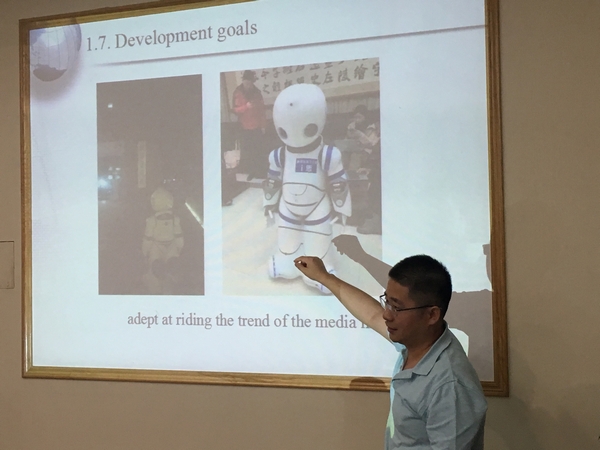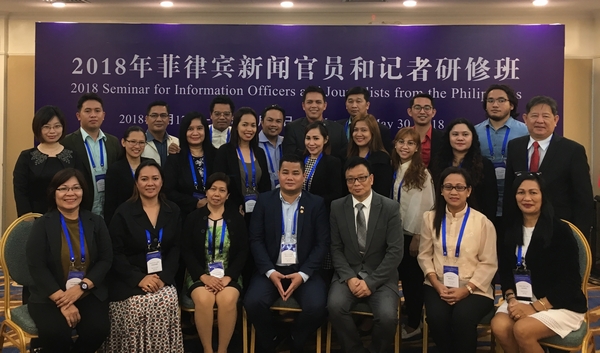Media developments in modern-day China

Filipino delegates meet Baby Cloud, a robot powered by artificial intelligence, at the Jiangxi Daily News Group main office in Nanchang, Jiangxi Province, China.
(Part 1)
With a pair of blue round eyes, Baby Cloud gleefully welcomed visitors while speaking in Mandarin.
A mobile tablet in hand, the white-shaded life-sized robot of Jiangxi Daily Newspaper Group showed off its unusual skills.
Guests of the newspaper were excited to see the robot’s ability to access past issues of the daily from as far back as its first issue in June 1949, close to 70 years ago.

Filipino delegates posed for a group photograph in one of the studios of Jiangxi Broadcasting and TV Station, in Nanchang, Jiangxi Province, China.
Baby Cloud can also interact and engage people in conversation even providing them with information on the weather and sports.
The creation of Baby Cloud even for a provincial newspaper group like Jiangxi Daily, located in the southeast province of Jiangxi, all but proves the emerging use of artificial intelligence (AI) in the People’s Republic of China (PRC).
The use of AI as one of the many developments of China’s media industry was witnessed by twenty-two (22) delegates from the Philippines consisting of government information officers and journalists from private media organizations, during a seminar last May.
“Media companies have used artificial intelligence to analyze audience habit. In this way, we will have a better understanding of the content we provide for them,” said Wei Xiao Hui, editor-in-chief of China.org.cn, a web portal hosted by China Publishing International Group (CIPG).

Deng Yushan, an international reporter of Xinhua News Agency, discussed the use of artificial intelligence in Chinese media during the overseas seminar participated in by Filipino delegates.
CDN Photo/ King Anthony Perez
The 14-day tour seminar brought the Filipino delegates to at least six major media organizations in China where they were able to engage media experts with discussions on the accomplishments and challenges of China’s media industry from its inception back in the 1920s until today.
Some of the more significant developments in China’s media industry include media integration, the use of big data technology, the growth of new media, and the high usage of mobile applications.
China’s top ten new media platforms are owned by telecommunication giants Baidu, Alibaba and Tencent.
Life without Facebook, Twitter
According to Chinese media experts, the Chinese people have not missed much with the unavailability of Western social media platforms like Facebook and Twitter, because they had developed their own social media.
Guan Juanjuan of China Radio International (CRI), believes that well-developed Chinese social media applications such as Sina Weibo and WeChat make the presence of Western social media applications unnecessary.
For instance, Tencent-owned WeChat, a popular mobile application allows for the mobile payment of bills and commodities.
Through its WeChat Pay option, Chinese people do not need to bring currency notes to pay their bills.

The twenty-two delegates of the 2018 Seminar for Information Officers and Journalists in the Philippines together with officials from the China Publishing International Group, host of the seminar. CDN Photo/ King Anthony Perez
They only need to scan the QR codes of their application account to purchase.
Sina Weibo, which is comparable to microblogging site Twitter, allows users to post as many as 10,000 Chinese words.
“Chinese internet giants developed a diversion which made people’s lives here more convenient. If these two things (WeChat and Weibo) would break out one day, people will find their lives difficult,” Guan said.
Guan admitted that some Chinese people, however, avail of Virtual Private Network (VPN) services to access blocked Western social media applications.
“The reason why we do not have Facebook lies between negotiations between foreign companies and the Chinse government. Hopefully, negotiations will bring fruitful results so that we won’t buy VPN,” Guan said.
(To be continued)
Disclaimer: The comments uploaded on this site do not necessarily represent or reflect the views of management and owner of Cebudailynews. We reserve the right to exclude comments that we deem to be inconsistent with our editorial standards.
